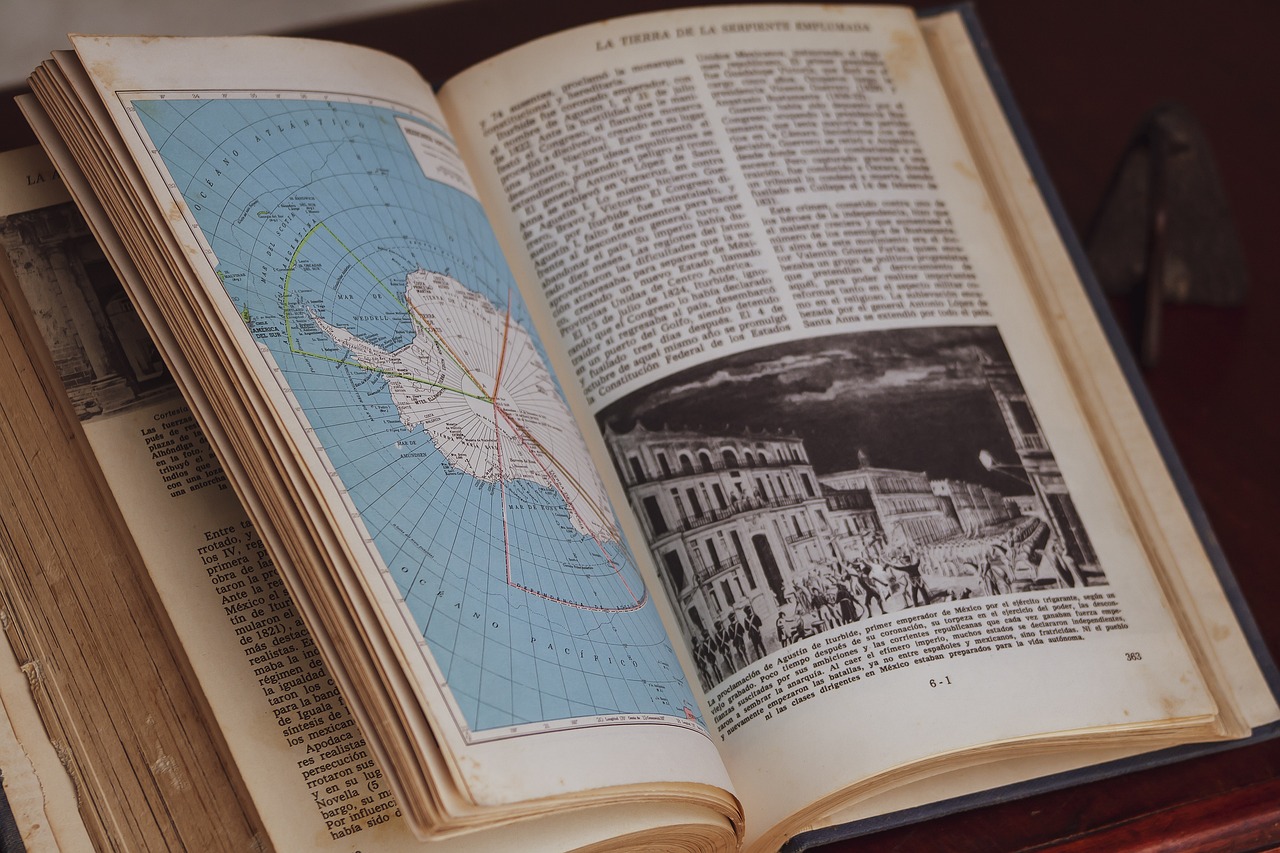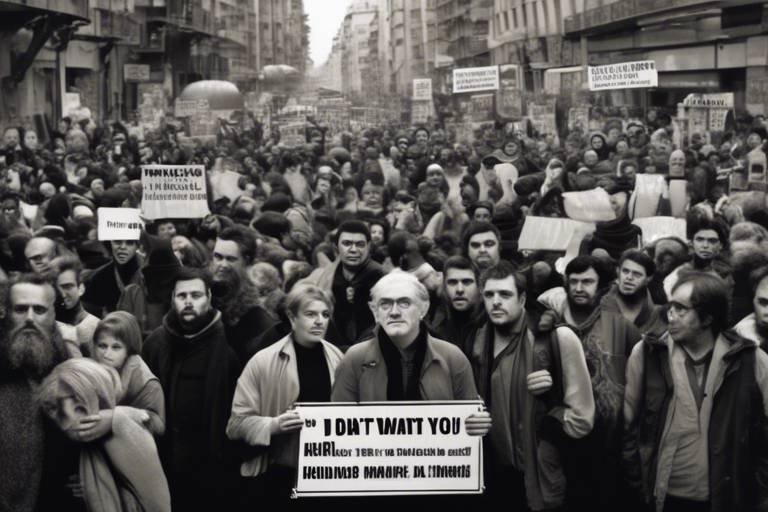Philosophy and Transnational Politics — An Enigmatic Connection
In a world that is increasingly interconnected, the interplay between philosophy and transnational politics emerges as a fascinating tapestry woven from the threads of ideas, ethics, and governance. But what exactly does this relationship entail? At its core, philosophy offers the foundational concepts that underpin political theory, guiding our understanding of justice, rights, and the very essence of governance itself. As we navigate the complexities of global interactions, it becomes evident that philosophical thought is not just an abstract pursuit; it is a vital component that shapes the very fabric of our political landscape. The ideas that philosophers have pondered for centuries are now more relevant than ever, as they influence how nations engage with one another and how we conceive of our roles as global citizens.
The connection between philosophy and transnational politics is akin to a dance, where each step and movement influences the other. As we delve deeper into this relationship, we uncover how philosophical inquiries challenge traditional notions of state sovereignty and encourage a broader understanding of what it means to belong to a global community. Transnationalism emerges not merely as a political theory but as a philosophical stance that invites us to rethink our identities and responsibilities in an ever-evolving world. This exploration leads us to consider the ethical dimensions of global governance, where the implications of our decisions extend far beyond our borders. How do we ensure that our actions reflect a commitment to justice that transcends national boundaries? These are the questions that philosophy helps us grapple with as we strive for a more equitable world.
As we embark on this journey through the intricate relationship between philosophy and transnational politics, we will uncover the philosophical underpinnings that inform our understanding of human rights, justice, and the ethical considerations that guide our interactions on the global stage. By examining these connections, we not only gain insight into the motivations behind state actions but also explore the profound implications of globalization on our cultural identities and political frameworks. In this era of rapid change and uncertainty, the role of philosophy becomes even more pronounced, as it provides us with the tools to navigate the complexities of our interconnected world.
Philosophy provides foundational concepts for political theory, influencing ideas of governance, justice, and rights. This section delves into key philosophical contributions that have shaped modern political thought.
Transnationalism challenges traditional notions of state sovereignty. Here, we explore how philosophical inquiry informs our understanding of transnational relationships and global citizenship.
Ethical considerations are paramount in transnational politics. This section discusses how philosophical ethics guide decision-making processes in international relations and governance.
The philosophical underpinnings of human rights are explored, emphasizing their significance in shaping transnational legal frameworks and moral responsibilities of states.
This subsection examines the concept of justice in a transnational context, highlighting philosophical debates surrounding global inequality and the responsibilities of nations.
The philosophy of international relations offers insights into the motivations behind state actions. This section analyzes various philosophical frameworks that explain political behavior on a global scale.
Globalization has profound philosophical implications for identity, culture, and politics. This section investigates how philosophical discourse addresses the challenges and opportunities presented by globalization.
Cultural exchange raises important philosophical questions about identity and ethics. Here, we explore how these exchanges influence transnational political dynamics and mutual understanding.
In times of global crises, philosophy plays a crucial role in shaping responses. This section discusses how philosophical frameworks inform actions taken in response to issues like climate change and humanitarian crises.
- What is the relationship between philosophy and politics?
Philosophy provides the foundational ideas that shape political theories, influencing concepts of justice, governance, and rights.
- How does transnationalism challenge state sovereignty?
Transnationalism promotes the idea that global relationships and citizenship transcend traditional state boundaries, encouraging a broader understanding of identity and responsibility.
- Why are ethical considerations important in global governance?
Ethics guide decision-making processes, ensuring that actions taken by states reflect a commitment to justice and fairness on a global scale.
- What role does philosophy play in addressing global crises?
Philosophical frameworks help inform and shape responses to global issues, providing a moral compass for actions taken in the face of challenges like climate change and humanitarian crises.

The Role of Philosophy in Political Theory
Philosophy serves as the bedrock of political theory, providing the essential concepts and frameworks that help us navigate the complex world of governance, justice, and rights. At its core, political philosophy seeks to answer fundamental questions about power and authority. Why do we need governance? What constitutes a just society? These inquiries are not just academic; they resonate deeply within our daily lives and shape the political landscape we inhabit.
One of the most significant contributions of philosophy to political theory is the concept of social contract. Think of it as an unwritten agreement among individuals to form a society, surrendering some of their freedoms in exchange for protection and social order. Philosophers like Thomas Hobbes, John Locke, and Jean-Jacques Rousseau have profoundly influenced our understanding of this contract, each offering unique perspectives on the nature of human beings and the legitimacy of governmental authority. For instance, Hobbes viewed humans as inherently self-interested, advocating for a strong central authority to maintain peace. In contrast, Locke emphasized natural rights—life, liberty, and property—arguing that governments exist primarily to protect these rights.
Moreover, the concept of justice is deeply rooted in philosophical thought. Philosophers like John Rawls introduced the idea of "justice as fairness," proposing that societal structures should be designed to benefit the least advantaged. This notion challenges us to rethink how we distribute resources and opportunities. In a world rife with inequality, Rawls’ theory prompts vital discussions about the ethical implications of our political decisions.
Philosophy also plays a crucial role in defining human rights. The Enlightenment period ignited a fervor for individual rights, leading to the development of universal human rights that transcend borders. Philosophers such as Immanuel Kant argued that every individual possesses inherent dignity and worth, laying the groundwork for modern human rights discourse. This philosophical framework has influenced international treaties and declarations, emphasizing that rights are not merely privileges granted by states but are fundamental entitlements of all human beings.
So, how do these philosophical foundations translate into political practice? They guide policymakers and leaders in crafting laws and regulations that reflect our collective values. For instance, when debating issues like immigration, healthcare, or education, the philosophical underpinnings of justice and rights compel us to consider not just the legal aspects but the moral implications of our choices. This interplay between philosophy and political theory is not just theoretical; it has real-world consequences that affect millions.
In conclusion, philosophy is not an abstract discipline confined to dusty books; it is a living, breathing force that shapes our political realities. By understanding the philosophical foundations of political theory, we can better engage in the ongoing dialogue about governance, justice, and rights, ensuring that our political systems reflect the values we hold dear.

Transnationalism: A Philosophical Perspective
Transnationalism represents a significant shift in how we understand the interconnectedness of our world. It challenges the traditional notions of state sovereignty, which often paint a picture of isolated nations operating independently. Instead, transnationalism posits that we live in a web of relationships that transcend borders, where ideas, cultures, and economies intermingle. This perspective invites us to rethink our identities and responsibilities in a globalized context. But how does philosophy inform this understanding?
At its core, philosophical inquiry encourages us to question the very foundations of our beliefs about governance and citizenship. It prompts us to ask: What does it mean to be a global citizen? As we navigate through the complexities of transnational relationships, philosophy provides a framework for understanding the ethical implications of our actions across borders. For instance, when we consider the refugee crisis, philosophical discussions about justice and human dignity compel us to confront our obligations to those who seek safety and a better life beyond their national confines.
Moreover, transnationalism isn't just about the movement of people; it's also about the flow of ideas and values. The philosophical discourse surrounding this movement is rich and varied. It encompasses various schools of thought, from cosmopolitanism, which advocates for universal moral obligations, to postcolonial theories that critique the power dynamics inherent in global interactions. These philosophical lenses allow us to analyze how cultural exchanges can either empower marginalized voices or perpetuate existing inequalities.
As we delve deeper into the philosophical implications of transnationalism, we encounter a critical question: How do we balance local identities with global responsibilities? This tension is at the heart of many contemporary debates, from immigration policies to climate change initiatives. Philosophers argue that a truly ethical response to transnational challenges requires recognizing the interconnectedness of our fates. For example, the actions of one nation regarding environmental policies can have far-reaching effects on the global community, underscoring the need for collaborative approaches that transcend national interests.
In conclusion, the philosophical perspective on transnationalism compels us to rethink our roles in an increasingly interconnected world. It encourages a dialogue that transcends borders, fostering mutual understanding and cooperation. As we engage with these ideas, we must remain vigilant in questioning our assumptions and striving for a more just and equitable global society.
- What is transnationalism? Transnationalism refers to the processes and relationships that transcend national boundaries, emphasizing interconnectedness in various aspects such as culture, politics, and economics.
- How does philosophy relate to transnationalism? Philosophy provides a framework for understanding the ethical implications of transnational relationships and encourages critical thinking about our global responsibilities.
- Why is global citizenship important? Global citizenship fosters a sense of responsibility towards others beyond one's national identity, promoting cooperation and understanding in addressing global challenges.
- What role does culture play in transnationalism? Cultural exchanges can influence identities and ethical considerations, shaping how nations and individuals interact on the global stage.

Ethics in Global Governance
When we think about global governance, it’s easy to get lost in the complex web of treaties, agreements, and political maneuvers. However, at the heart of this intricate system lies a bedrock of ethical considerations. Ethics in global governance isn't just a fancy term thrown around by scholars; it’s the very essence that guides nations in their interactions with one another. Imagine a world where countries operate solely on self-interest, disregarding the welfare of others. The chaos that would ensue is a stark reminder of why ethical frameworks are crucial. They provide a moral compass that helps states navigate the murky waters of international relations.
The role of ethics in global governance can be broken down into several key areas, including accountability, transparency, and fairness. These principles not only foster trust among nations but also ensure that global decisions reflect a collective moral responsibility. For instance, when countries come together to tackle pressing issues like climate change, ethical considerations compel them to prioritize the needs of vulnerable populations over mere economic gains. This is where the philosophical underpinnings of ethics come into play, urging leaders to think beyond borders and consider the global impact of their actions.
Furthermore, the concept of ethical cosmopolitanism emerges as a powerful lens through which we can analyze global governance. This philosophical perspective posits that all human beings, regardless of nationality, deserve equal moral consideration. It challenges the traditional notion of state sovereignty by advocating for a more inclusive approach to governance. As countries grapple with transnational challenges, the ethical cosmopolitan view encourages them to adopt policies that transcend national interests, focusing instead on shared human values. This could mean supporting international aid initiatives or collaborating on global health strategies, all driven by a moral obligation to protect human dignity.
To illustrate the significance of ethics in global governance, consider the following table that summarizes the core ethical principles and their implications:
| Ethical Principle | Description | Implications for Global Governance |
|---|---|---|
| Accountability | The obligation of states to justify their actions | Fosters trust and transparency in international agreements |
| Transparency | Openness in decision-making processes | Encourages informed participation from global citizens |
| Fairness | Equitable treatment of all nations | Ensures that policies do not disproportionately harm weaker states |
In summary, the ethical dimension of global governance is not merely an academic exercise; it has real-world implications that affect millions of lives. As we navigate an increasingly interconnected world, the call for ethical governance becomes more urgent. Philosophers, policymakers, and citizens alike must engage in a dialogue about these ethical principles to ensure that our global systems reflect our shared humanity. After all, in a world where borders are becoming less significant, our moral responsibilities to one another are more important than ever.
- What is global governance? Global governance refers to the way international affairs are managed across countries through cooperation and collaboration.
- How does ethics play a role in global governance? Ethics guides nations in making decisions that reflect moral responsibilities, ensuring accountability, transparency, and fairness.
- What is ethical cosmopolitanism? Ethical cosmopolitanism is the idea that every individual deserves equal moral consideration, regardless of their nationality.
- Why is ethical governance important? Ethical governance is crucial for building trust among nations and addressing global challenges in a way that respects human dignity.

Human Rights and Philosophy
When we talk about human rights, we are diving into a pool of philosophical thought that has shaped not only our moral compass but also the very fabric of international law. The roots of human rights can be traced back to ancient philosophical discussions, where thinkers like Socrates and Aristotle laid the groundwork for understanding justice, virtue, and the inherent dignity of individuals. These ideas have evolved over centuries, leading to the modern conception of human rights as universal entitlements that every individual possesses simply by being human.
At its core, the philosophy of human rights challenges us to consider fundamental questions: What does it mean to be human? What rights are inherent to our existence? Philosophers like John Locke argued for the natural rights of individuals, which include life, liberty, and property. This idea of natural rights became a cornerstone for later declarations of human rights, such as the Universal Declaration of Human Rights adopted by the United Nations in 1948.
However, the philosophical discourse surrounding human rights is not without its complexities and controversies. Different philosophical traditions interpret human rights in various ways. For instance, utilitarianism might prioritize the greatest good for the greatest number, potentially sidelining the rights of minorities. On the other hand, Kantian ethics emphasizes the intrinsic worth of each individual, advocating for the respect and protection of human rights irrespective of the consequences. This divergence in philosophical thought raises critical questions about how we define and implement human rights across different cultures and political systems.
Moreover, the philosophical underpinnings of human rights also touch upon the responsibilities that come with these rights. It's not just about what we are entitled to; it's also about our duties towards others. This leads us to consider the concept of global citizenship, where individuals recognize their interconnectedness and the moral obligations they hold towards one another, transcending national borders. In this context, rights are not merely privileges but are intertwined with responsibilities that foster a more just and equitable world.
To illustrate the relationship between human rights and philosophy, consider the following table that highlights key philosophical influences and their contributions to the understanding of human rights:
| Philosopher | Key Contribution |
|---|---|
| John Locke | Natural rights theory; life, liberty, and property as fundamental rights. |
| Immanuel Kant | Emphasis on inherent dignity and moral worth of individuals. |
| Jeremy Bentham | Utilitarianism; rights as instruments for promoting overall happiness. |
| Amartya Sen | Capabilities approach; focusing on what individuals are able to do and be. |
As we navigate the complexities of a globalized world, the philosophical discourse on human rights remains crucial. It not only informs our understanding of justice and ethics but also shapes the frameworks through which we advocate for and protect these rights. In an era where violations of human rights are rampant, philosophical inquiry provides a necessary lens through which we can analyze, critique, and ultimately strive to improve the state of human rights globally.
- What are human rights? Human rights are fundamental rights and freedoms that belong to every person in the world, from birth until death.
- Why are human rights important? They protect individuals from abuse and ensure that everyone can live with dignity, freedom, and equality.
- How do philosophy and human rights intersect? Philosophy provides the foundational ideas that shape our understanding of what human rights are and why they matter.
- Can human rights vary across cultures? Yes, interpretations of human rights can differ based on cultural, social, and political contexts, leading to ongoing debates about their universality.

Justice Across Borders
When we think about justice, we often picture it as a concept that operates within the confines of a single nation-state. However, the reality is far more complex and intriguing. challenges us to reconsider our understanding of fairness, equality, and accountability on a global scale. It raises important questions: How do we ensure justice for individuals who find themselves in situations beyond their national jurisdictions? What responsibilities do nations have toward one another in addressing injustices that transcend borders?
At the heart of these inquiries lies the philosophical debate surrounding global inequality and the ethical obligations of states. Philosophers have long argued that justice should not be limited by geographical boundaries. For instance, consider the plight of refugees fleeing war-torn countries. Shouldn't nations that are more stable and prosperous bear some responsibility to assist those in need? This is where the philosophical underpinnings of justice become particularly relevant. They compel us to think beyond our immediate interests and consider the broader implications of our actions.
Moreover, the concept of justice across borders is not merely theoretical; it has practical implications that can be observed in the realm of international law and human rights. International treaties and agreements serve as frameworks designed to promote justice and accountability among nations. For example, the Universal Declaration of Human Rights outlines fundamental rights that every individual is entitled to, regardless of their nationality. This document represents a significant philosophical commitment to the idea that justice is a universal concern, transcending borders and cultures.
However, implementing these principles can be fraught with challenges. Different nations have varying interpretations of justice, often influenced by their unique cultural, political, and historical contexts. This divergence can lead to conflicts and misunderstandings, making it essential for philosophical discourse to evolve. To facilitate this, we must engage in open dialogues that promote mutual understanding and respect for differing perspectives.
In addition, the rise of globalization has further complicated the landscape of justice. As nations become more interconnected, the actions of one state can have far-reaching consequences for others. For example, environmental policies in a developed country can impact climate change, which disproportionately affects vulnerable populations in developing nations. Here, the question of justice becomes even more pressing: How do we hold nations accountable for their actions that lead to global injustices?
To navigate these complexities, we can draw upon various philosophical frameworks that provide insights into justice across borders. For instance, John Rawls' theory of justice as fairness emphasizes the importance of equitable distribution of resources and opportunities. His principles can be applied to global contexts, urging wealthier nations to assist those that are less fortunate. Similarly, Martha Nussbaum's capabilities approach focuses on what individuals need to live a flourishing life, advocating for policies that promote human dignity across borders.
Ultimately, achieving justice across borders requires a collective effort that transcends political and cultural divides. It calls for a commitment to ethical reasoning and a willingness to engage with others in meaningful ways. By fostering international cooperation and dialogue, we can work toward a world where justice is not an abstract ideal but a lived reality for everyone, regardless of where they come from.
- What is justice across borders?
Justice across borders refers to the principles and practices that ensure fairness, accountability, and human rights for individuals beyond their national jurisdictions. - Why is justice important in a global context?
Justice is crucial in a global context because injustices in one part of the world can have ripple effects that impact people everywhere, necessitating a collective response. - How do philosophical theories contribute to understanding justice globally?
Philosophical theories provide frameworks that help us analyze and address issues of inequality, responsibility, and ethical obligations among nations. - What role do international laws play in promoting justice?
International laws and treaties set standards for human rights and accountability, guiding nations in their responsibilities toward justice on a global scale.

Philosophy of International Relations
When we dive into the , we enter a realm that attempts to unravel the complex tapestry of state interactions on a global scale. This field isn't just about the political maneuvers and treaties; it’s about understanding the underlying motivations that drive nations to act the way they do. Imagine international relations as a chess game, where each piece represents a country, and every move is calculated based on a mixture of ethics, power dynamics, and historical context. The philosophical frameworks that inform this game are crucial in deciphering the strategies employed by various states.
At the heart of this philosophy lies the question of human nature. Are states inherently self-interested, as realism suggests, or can they work together for the common good, as idealism proposes? This debate shapes policies and international agreements. Realists argue that the international system is anarchic, where power and survival are the ultimate goals. In contrast, idealists believe that cooperation and mutual benefit can prevail, emphasizing the role of international organizations and norms.
Moreover, the philosophy of international relations considers the impact of ethics on state behavior. Ethical theories, such as utilitarianism and deontology, provide frameworks for evaluating the moral implications of foreign policy decisions. For instance, should a nation prioritize its own interests at the expense of another's well-being? This ethical dilemma often surfaces in discussions about humanitarian interventions, trade agreements, and environmental policies. By examining these choices through a philosophical lens, we gain a deeper understanding of the moral responsibilities that come with power.
Additionally, the rise of globalization has further complicated the landscape of international relations. As nations become increasingly interconnected, the old paradigms of sovereignty and state-centric politics are challenged. Philosophers are now tasked with addressing questions of global citizenship and the ethical implications of transnational issues. How do we balance national interests with global responsibilities? This inquiry is essential in a world where crises like climate change and pandemics know no borders.
To illustrate the diverse philosophical perspectives in international relations, consider the following table:
| Philosophical Framework | Key Ideas |
|---|---|
| Realism | Focuses on state power, national interest, and the anarchic nature of international relations. |
| Idealism | Emphasizes cooperation, international law, and the potential for peace through collective action. |
| Constructivism | Examines how social constructs, identities, and norms shape state behavior and international relations. |
| Critical Theory | Challenges traditional power structures and seeks to address issues of inequality and injustice. |
In summary, the philosophy of international relations is not merely an academic pursuit; it is a vital lens through which we can understand the complexities of our interconnected world. By questioning the motivations behind state actions and examining the ethical implications of these actions, we can better navigate the challenges that lie ahead. As we grapple with global issues, the philosophical insights gained from this discipline will be invaluable in shaping a more just and equitable world.
- What is the main focus of the philosophy of international relations? The main focus is to understand the motivations and ethical implications behind state actions on a global scale.
- How do philosophical frameworks influence foreign policy? Philosophical frameworks provide the ethical and theoretical foundations that guide decision-making in foreign policy.
- What role does globalization play in international relations? Globalization challenges traditional notions of state sovereignty and emphasizes the need for cooperation among nations.

Globalization and Its Philosophical Implications
Globalization is not just a buzzword; it's a complex phenomenon that reshapes our world in profound ways. It intertwines economies, cultures, and political landscapes across borders, creating a tapestry of interconnectedness that can be both exhilarating and daunting. But what does this mean for philosophy? Well, globalization invites us to rethink our understanding of identity, ethics, and governance. It's like a giant puzzle where every piece influences the others, and the picture we see depends on how we fit them together.
As we dive into the philosophical implications of globalization, it's essential to recognize that this process is not merely about economic integration. It raises critical questions about what it means to belong in a world that is becoming increasingly fluid. For instance, how do we maintain our cultural identity while embracing global citizenship? This is where philosophical discourse comes into play, offering frameworks that help us navigate these turbulent waters.
One of the significant philosophical implications of globalization is the challenge it poses to traditional notions of state sovereignty. As nations become more interconnected, the power dynamics shift. Philosophers like Immanuel Kant and John Rawls have explored concepts of cosmopolitanism and global justice, arguing that our moral responsibilities extend beyond our national borders. This perspective encourages us to think about global governance as a collaborative effort rather than a series of isolated actions dictated by individual states.
Moreover, globalization prompts us to reconsider our ethical frameworks. The rapid exchange of ideas and cultures can lead to a clash of values, raising questions about moral relativism. Are our ethical standards universal, or do they vary based on cultural context? This ongoing debate is crucial as we engage with diverse populations and strive for mutual understanding. To illustrate this, consider the following table that outlines key philosophical perspectives on ethics in a globalized world:
| Philosopher | Key Idea |
|---|---|
| Immanuel Kant | Categorical Imperative: Universal moral law applicable to all rational beings. |
| John Rawls | Justice as Fairness: Principles of justice should be chosen under a veil of ignorance. |
| Peter Singer | Effective Altruism: Ethical obligation to alleviate suffering globally. |
Globalization also brings forth philosophical inquiries regarding cultural exchange. As ideas and practices flow across borders, they challenge our preconceived notions of identity. Are we defined by our nationality, or can we embrace a more fluid identity that incorporates multiple influences? This is akin to a rich tapestry, where each thread contributes to a larger narrative. The philosophical exploration of cultural exchange encourages us to appreciate diversity while recognizing our shared humanity.
In times of global crises, the role of philosophy becomes even more pronounced. Whether it’s climate change, humanitarian disasters, or pandemics, philosophical frameworks guide our responses. They compel us to ask difficult questions: What is our moral obligation to those affected? How do we balance national interests with global responsibilities? These inquiries are vital as we strive to create a just world that transcends borders.
In conclusion, the philosophical implications of globalization are vast and multifaceted. They challenge us to rethink our identities, ethical standards, and responsibilities in an interconnected world. As we navigate this complex landscape, philosophy serves as a compass, guiding our understanding of the intricate relationship between global dynamics and human experience.
- What is globalization? Globalization refers to the process of increased interconnectedness among countries, driven by trade, technology, and cultural exchange.
- How does globalization affect identity? Globalization can lead to a blending of cultures, prompting individuals to navigate multiple identities and redefine what belonging means.
- What role does philosophy play in globalization? Philosophy provides frameworks for understanding ethical responsibilities, cultural exchange, and the implications of global governance.
- Are ethical standards universal in a globalized world? This is a debated topic; some argue for universal ethics, while others advocate for moral relativism based on cultural context.

Cultural Exchange and Philosophy
Cultural exchange is like a vibrant tapestry, woven together with threads of diverse beliefs, practices, and values. It’s a dynamic process that not only enriches societies but also poses intriguing philosophical questions about identity and ethics. As we navigate through this interconnected world, we find ourselves at the crossroads of various cultures, each contributing unique perspectives that challenge our preconceived notions. But how does this interplay of cultures shape our understanding of philosophy?
At its core, cultural exchange invites us to reconsider our notions of self and other. When we engage with different cultures, we are forced to confront our own biases and assumptions. This is where philosophy steps in as a guiding light, helping us to reflect on our identities in relation to others. For instance, consider the philosophical idea of cosmopolitanism, which advocates for a global citizenship that transcends national boundaries. This notion encourages us to embrace our shared humanity while recognizing the richness of cultural diversity.
Moreover, cultural exchange can lead to profound ethical considerations. When we encounter new ways of thinking, we often find ourselves grappling with questions about moral relativism and universalism. Are our ethical standards applicable to all cultures, or do they need to be adapted to fit different contexts? This dilemma is central to philosophical discourse, as it challenges us to find a balance between respecting cultural differences and advocating for universal human rights.
To illustrate this further, let’s consider a few key philosophical perspectives that emerge from cultural exchanges:
- Dialogue and Understanding: Engaging in conversations with individuals from different backgrounds fosters mutual understanding and respect, paving the way for collaborative solutions to global issues.
- Ethical Pluralism: This perspective suggests that multiple moral frameworks can coexist, allowing us to appreciate the complexity of ethical dilemmas in a multicultural world.
- Intercultural Ethics: This branch of philosophy examines how ethical principles can be developed through interactions between cultures, promoting a more inclusive approach to moral reasoning.
As we delve deeper into the implications of cultural exchange, we must also acknowledge the role of technology in facilitating these interactions. The internet, social media, and global travel have made it easier than ever to connect with people from various cultures. However, this accessibility also raises questions about cultural appropriation and the commodification of cultural practices. Philosophy challenges us to critically evaluate these issues, urging us to approach cultural exchange with sensitivity and respect.
In conclusion, the relationship between cultural exchange and philosophy is a rich and complex one. As we continue to engage with diverse cultures, we are not only expanding our intellectual horizons but also reshaping our ethical frameworks. The philosophical inquiries that arise from these exchanges encourage us to think critically about our place in the world and our responsibilities towards others. So, the next time you find yourself immersed in a different culture, take a moment to reflect on the philosophical implications of that experience. You might just discover a new way of seeing the world.
Q: What is cultural exchange?
A: Cultural exchange refers to the sharing of ideas, values, and traditions between different cultures, often leading to mutual understanding and enrichment.
Q: How does philosophy relate to cultural exchange?
A: Philosophy helps us critically assess and understand the ethical implications of cultural exchange, guiding us in navigating identity, moral relativism, and universalism.
Q: Why is ethical pluralism important in cultural exchanges?
A: Ethical pluralism acknowledges that multiple moral frameworks can coexist, allowing for a more nuanced understanding of ethics in a multicultural context.

Philosophical Responses to Global Crises
In an era marked by unprecedented global crises—be it climate change, pandemics, or humanitarian disasters—the role of philosophy becomes increasingly vital. Philosophy acts as a compass, guiding our understanding of these challenges and shaping the responses we formulate. When crises strike, they often expose the underlying assumptions of our political systems and ethical frameworks. This is where philosophical inquiry can shine a light on the complexities of our shared human experience.
Consider, for instance, the ethical dilemmas posed by climate change. Philosophers like Peter Singer advocate for a utilitarian approach, urging us to consider the greatest good for the greatest number. This perspective compels us to think beyond our immediate needs and recognize our responsibilities to future generations. Such philosophical frameworks challenge us to rethink our consumption patterns and advocate for sustainable practices that might benefit the planet as a whole.
Moreover, the urgency of humanitarian crises prompts a reevaluation of our moral obligations. Immanuel Kant's categorical imperative, which emphasizes treating individuals as ends in themselves rather than as means to an end, serves as a foundation for human rights discourse. This philosophical stance encourages nations to prioritize humanitarian aid and support for vulnerable populations, regardless of national borders. In this context, philosophy becomes a tool for advocating compassion and justice in international relations.
Philosophical responses to global crises also encompass the need for collective action. The interconnectedness of our world means that no nation can tackle these issues in isolation. Philosophers like Hannah Arendt remind us of the importance of public discourse and collective responsibility. In times of crisis, engaging in dialogue and fostering a sense of global citizenship can empower individuals and communities to take meaningful action.
To illustrate the impact of philosophical thought on global crises, let's consider a few key areas:
| Global Crisis | Philosophical Framework | Implications |
|---|---|---|
| Climate Change | Utilitarianism | Focus on sustainable practices for future generations |
| Humanitarian Disasters | Kant's Categorical Imperative | Emphasis on moral obligations to aid the vulnerable |
| Global Pandemics | Communitarianism | Highlighting the importance of community and collective health |
In summary, the philosophical responses to global crises are not just abstract theories; they are actionable insights that can guide us in addressing some of the most pressing challenges of our time. By engaging with these philosophical perspectives, we can foster a deeper understanding of our collective responsibilities and inspire a more just and equitable world.
- How does philosophy influence our response to climate change?
Philosophy encourages us to consider the long-term implications of our actions, advocating for sustainable practices that benefit future generations. - What role does ethics play in humanitarian crises?
Ethical frameworks, such as Kant's categorical imperative, emphasize our moral obligations to assist those in need, regardless of borders. - Can philosophy help foster global cooperation?
Yes, philosophical discourse promotes dialogue and collective responsibility, essential for addressing interconnected global challenges.
Frequently Asked Questions
- What is the connection between philosophy and transnational politics?
Philosophy and transnational politics are intricately linked, as philosophical ideas shape our understanding of governance, justice, and ethics on a global scale. Philosophical inquiry helps us navigate complex political dynamics that transcend borders, allowing us to question traditional notions of state sovereignty and explore the concept of global citizenship.
- How does philosophy influence political theory?
Philosophy provides the foundational concepts that underpin political theory. Think of it as the blueprint for constructing our understanding of rights, justice, and governance. Key philosophical contributions have laid the groundwork for modern political thought, helping us to critically analyze and engage with political systems around the world.
- What role do ethics play in global governance?
Ethics are crucial in transnational politics, guiding decision-making processes in international relations. Philosophical ethics encourage leaders and policymakers to consider the moral implications of their actions, ensuring that decisions are made not just for political gain but with a sense of responsibility towards global citizens.
- Why are human rights significant in the context of philosophy?
Human rights are deeply rooted in philosophical thought, emphasizing the moral responsibilities of states towards individuals. The philosophical underpinnings of human rights help shape transnational legal frameworks, ensuring that justice and dignity are upheld across borders, regardless of nationality.
- How does globalization impact philosophical discourse?
Globalization presents unique challenges and opportunities that philosophical discourse seeks to address. It raises important questions about identity, culture, and political dynamics, prompting us to consider how interconnectedness influences our understanding of ourselves and our responsibilities to others in a globalized world.
- What are the philosophical responses to global crises?
In times of global crises, such as climate change or humanitarian disasters, philosophy plays a vital role in shaping our responses. Philosophical frameworks help us analyze the ethical dimensions of these crises, guiding actions that are not only effective but also morally sound and just.



















